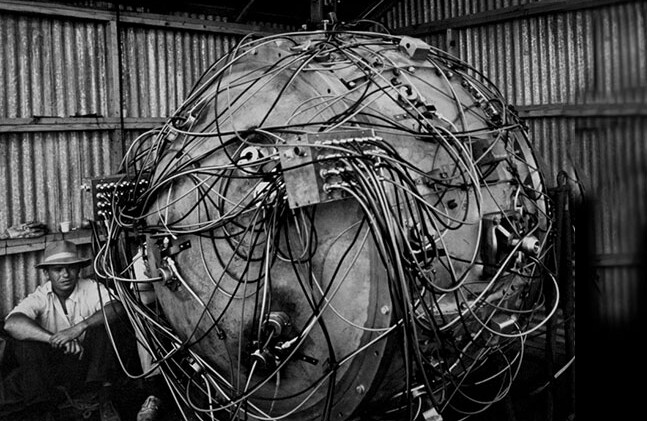Pregunta orientadora
No hay duda de que las armas nucleares son muy peligrosas. Lo que no está claro es que sean muy útiles. La pregunta es: ¿por qué conservar una tecnología que es muy peligrosa pero no muy útil?
Vea la respuesta de Ward Wilson a esta pregunta en el vídeo.
Nuclear weapons can’t be disinvented. This is the killer. This is the backbreaker. This argument has won debates for 50 years. Sometimes proponents say, "Well, you can’t stuff the nuclear genie back in the bottle."
The power that this argument has comes from the fact that it’s absolutely true. You can’t disinvent technology. It also happens to be absolutely irrelevant. It’s an entirely specious argument. No technology is ever disinvented. Don't get me wrong; technology goes out of existence all the time. Just try to get tech support on any electronic device that’s more than three years old. Technology goes out of existence one of two ways, however: (1) Better technology comes along, or (2) people realize it was dumb technology to begin with. Consider the penny-farthing. These bicycles from the 1900s with one big wheel and one little wheel were difficult to get up on and dangerous to fall off of. But no one warned that you can’t stuff the penny farthing genie back into the bottle. When better bicycles came along with two wheels the same size, they fell out of existence with no push from us.
The question is not whether or not nuclear weapons can or cannot be disinvented. That’s a specious argument. The question is whether or not nuclear weapons are useful military technology. On the face of it, that seems unlikely since no one has found a situation in which they really wanted to use nuclear weapons in the last 68 years.
The genie argument is no more than a cheap debater’s trick, but it is psychologically suggestive. It reveals something about proponents’ thinking. In the minds of proponents, nuclear weapons are the genie. They are magic. Wave your nuclear around and people will do whatever you say. If nuclear weapons are magic, then abolition is impossible. Everyone wants magic. No one would ever give it up. But if nuclear weapons are clumsy, blundering, overly large, expensive, outmoded dinosaurs, then abolition takes on a different cast.
Nuclear weapons can’t be disinvented, but no technology is ever disinvented.
We have been told for so long that nuclear weapons are awesome, that they give us magic power, that the reality has gotten lost. The reality is that nuclear weapons are not very good weapons. The first problem is that they are messy. You drop a bomb on the enemy’s troops and the radiation can blow back on your own troops.
This is the famous study by Sidney Drell and Frank von Hippel, physicists, in 1976. They did a study of a limited nuclear attack on the United States. You can see from the radiation trails that even an attack where you try to use nuclear weapons surgically, the radiation spreads all across the country. They calculated that 20 million people would die.
Nuclear weapons have enormous limitations.
The second problem with nuclear weapons is that they are so big. Proponents believe, in a rather simpleminded way, that the bigger a weapon is, the better it is; bigger is always better. It seems to me that that’s probably not so, that probably the relationship between utility and size is a bell curve, and that at the top it’s probably something that is the size of a building. Almost all targets in war are man-made. I’m making this up, but I would guess that 95 percent of all targets in war are building-size or smaller. If you use a nuclear weapon to destroy a building in a city, you have to blow up three-quarters of the city just to destroy the building. Why would you want to do that?
There are weapons that are too big to be useful. And it shouldn’t surprise us that nuclear weapons have not been used for 70 years. The whole trend in warfare is away from bigger weapons. The trend is towards smaller, more intelligent, more precise weapons. Precision-guided munitions are the future in warfare, not big, blundering weapons from the past.
There’s no question that nuclear weapons are very dangerous. It’s just not clear that they are very useful. The question is, why would you want to keep technology that’s very dangerous but not very useful?
Preguntas adicionales de pensamiento crítico:
- ¿Por qué argumenta el orador que las armas nucleares no son muy útiles?
- ¿Cuáles son algunos argumentos a favor de las armas nucleares? (la respuesta no se encuentra en el clip)
- ¿Por qué el orador se refiere a las armas nucleares como a un genio?
- ¿Puede dar ejemplos de tecnologías que haya visto ir y venir?
- ¿Por qué ya nadie lo usa?
- Si la tecnología desaparece con el tiempo, ¿por qué seguimos teniendo armas nucleares después de la Guerra Fría?
Recursos sobre ética y militarización
15 DE DICIEMBRE DE 2021 - Podcast
¿Es esencial la militarización para la seguridad en 2022 y más allá?
28 DE JULIO DE 2022 - Podcast
The Doorstep: ¿Cuál es la amenaza real de una guerra nuclear? con el Dr. Gary Samore
El profesor Gary Samore, de la Universidad Brandeis, se une a los copresentadores de Doorstep, Nick Gvosdev y Tatiana Serafin, para hablar de cómo la disuasión nuclear fomenta la moderación y la cautela, y de la esperanza ...
4 DE FEBRERO DE 2016 - Artículo
¿Disuasión o desarme? La ética de la guerra nuclear
¿Es moralmente permisible utilizar un arma nuclear en algunas circunstancias? ¿Es ético aplicar la disuasión nuclear (amenazar con utilizar armas atómicas) como autodefensa...



